2. Other types of Self-Harm
I stopped cutting myself when I was 30. There was no outward impulse, I think, as I had not started therapy yet. I just decided that I was done with that.
I had just been broken up with and tried to let out that pain, like I used to, but it did not bring me peace and quiet anymore. It did not work anymore, so I stopped.
But I still self-harm. For sometimes different reasons than before. I have identified some of the ways in which I do. The list includes physical self-harm. Just not using a blade on me.
Other people might do other things, or none of them, or do the same things for different reasons. People are complicated. I find it hard enough to understand myself, I do not presume to understand others. Maybe you will find something in this list that makes it easier for you to relate to the whole concept and understand better how it happens.
Self-harming habits I’ve identified so far:
- skin picking
- postponing eating until I feel sick (not on purpose)
- staying up too late, which gives me sleep deprivation
- amassing too much overtime
- dropping out of contact with friends
- not calling in sick when I feel awful
- not asking for help when I need it
- casual sex for the wrong reasons
- denying myself joy
- switching to “auto pilot”
- trash talking myself
- pretend everything is well.
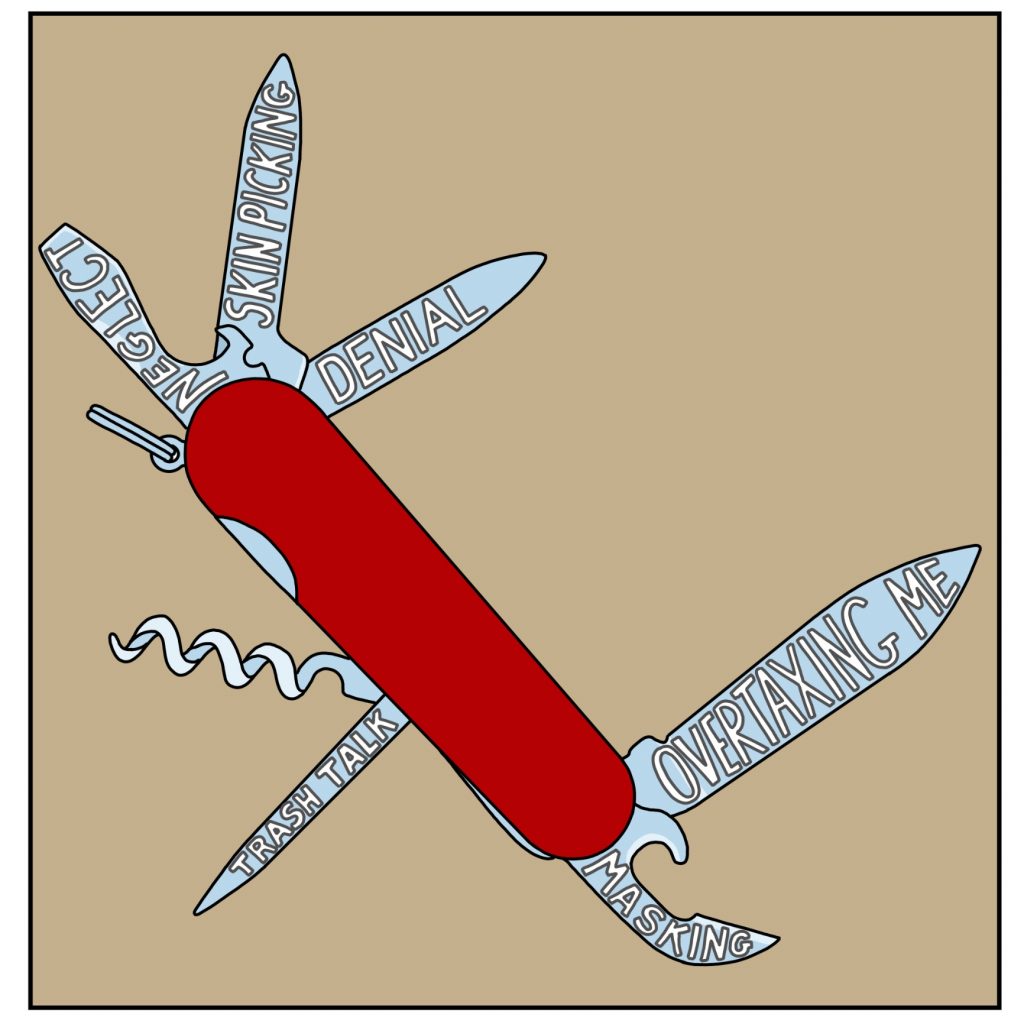
I will address these and the reasons I have figured out so far, so I can also add what I can or maybe could do to stop harming myself. The reasons were not apparent to me at the time I started the habits. They only became clear over time. And with help, in some cases. Some things I already managed to let go of, some are still an issue. I am working on it.
Skin picking
With me, that is cuticles, scabs and pimples where no one would see them anyway. I’ll focus on cuticles here as an example.
What happens?
I sit on the couch or at my desk, take a pair of tweezers and start ripping off dried skin, not only hangnails. Every bit of remotely loose or dry skin around the nails. Quite often until it bleeds. I am doing this consciously and knowingly. I find it hard to stop, even when I know that this next bit will be the one bit too much.
Why is this self-harm?
In this case the answer is rather obvious. I rip off skin until it bleeds or almost bleeds. That is self-harm.
Why do I do that?
I have at some point internalized the sentence, “I need to be productive in order to have worth.“ I know this sounds odd. But picking at my skin is an action. It counts as doing something. As does eating.
In situations where I cannot muster the energy, concentration, or motivation to do something useful but still feel the need to be productive, I pick at my skin. I have no idea why I think that raw edges around my nails are in any way a goal worth achieving.
Another reason can be that I should be doing or thinking about something else and need a reason to not do that right now. Here, too, skin picking counts as an activity that can take precedence over whatever else it is I do not want to do.
What could I do instead?
I am trying to tell myself that it is okay to just rest until I feel I can do something else. I can learn that it is okay to not achieve anything when I do not have the capacity to do so. That there is no minimum of tasks that need to be done.
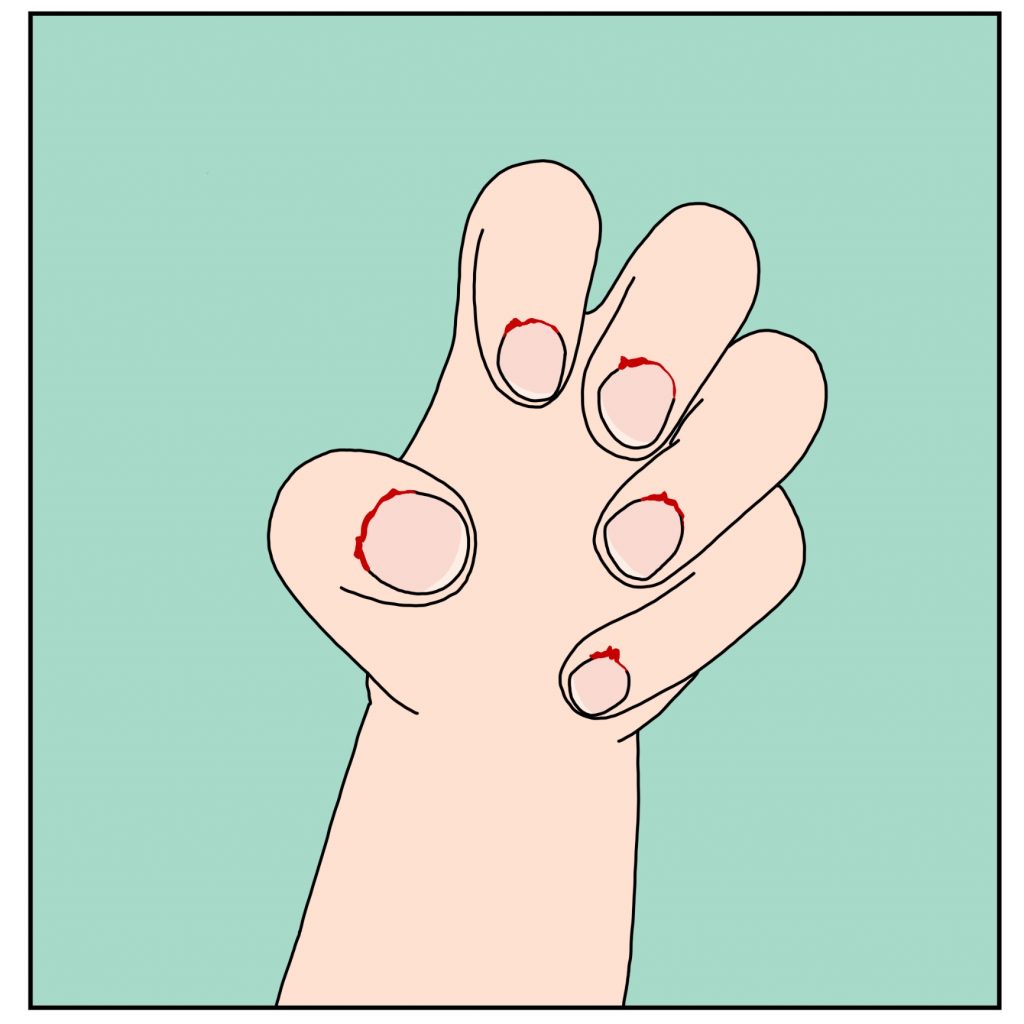
This works for both cases. I can just put off that other thing without picking at my skin. Or tackle it instead.
Variant:
Of course there are also the usual hangnails and things that need to be seen to. That is a different thing. Sometimes I catch myself worrying at some dried skin so it does not catch on something, simultaneously knowing this will end badly and still believing that I am making things better. I am unsure how to approach those instances.
Postponing eating until I feel sick (not on purpose)
The note, “not on purpose“ is important. It is not my goal to feel sick. I just do not get up and get food.
What happens?
I am hungry. I sit on the couch. I know that I *could* get up and make some food or a snack. Something as simple as instant ramen. Or I could order delivery. But it does not happen. I stay hungry until I feel sick.
Why is this self-harm?
I am not damaging the outside of my body and not leaving any visible marks or anything. I just do not eat, which is my choice, right? If someone else refused to give me food when I was hungry, this would count as torture or mistreatment. The effect on my body is the same, whether someone else does it to me or I do it myself. It is harmful treatment.
Why do I do that?
The simple answer is that I cannot be bothered. Which means I do not care enough for myself to even see to my basic needs. Usually, I am just too tired and think it can wait a bit longer.
What could I do instead?
I ask myself: what would my friend do if they were here, and I was hungry? The answer is: they would make me food. So, I take over for my friend who is not here and make myself food. If they would care enough, I can care enough.
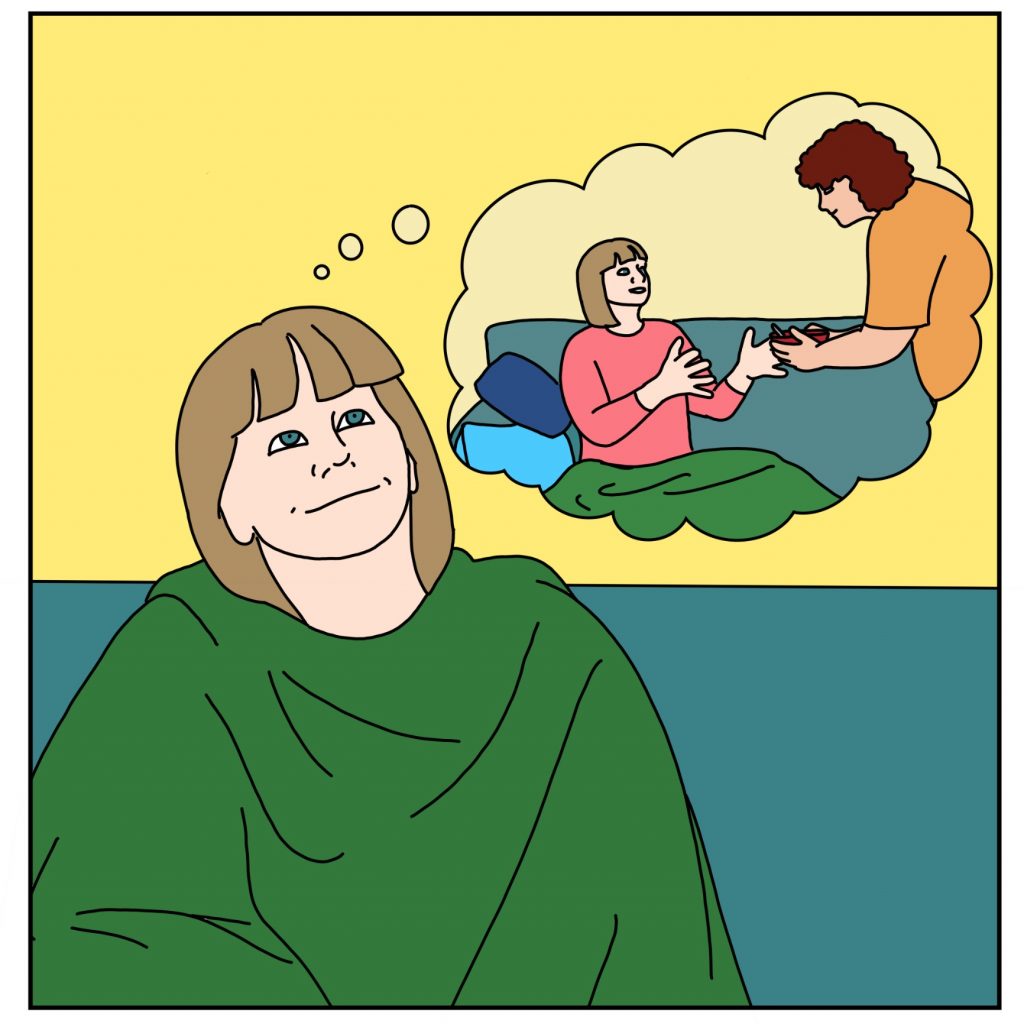
I hope to make it to the point where I can just say “I deserve food“ and make it. And maybe even to the point where I do not need to have this discussion with myself at all.
Staying up too late, which gives me sleep deprivation.
I know that I am not the only one going to bed too late. We all have different reasons.
Even I have different reasons.
What happens?
In the morning, I do take a long time to wake up properly. My brain works best between early afternoon and early morning, which is not ideal for a regular day job. I slug through the mornings. When my brain is finally awake, I want to make the best use of my functional hours and so keep doing things until way too late.
When I come back from an afternoon or evening out, I need time to unwind before being able to sleep. I do not always calculate this time in when deciding when I have to leave for home.
In the morning my alarm goes off and I feel even worse than on mornings with enough sleep.
Why is this self-harm?
Sleep deprivation is a form of torture. The brain needs the down time, the body needs the down time. Without enough sleep, I get grumpy, and my immune system is unhappy.
This is a preventable situation that can cause damage to the body and definitely does damage to my mood.
Why do I do that?
This is in varying parts a failure to calculate properly, denying the fact that I need more time to unwind than I used to, a prioritization of now over later and also a feeling of “now that I can do stuff, I have to do stuff”.
What could I do instead?
After talking to my boss, I have already moved my working hours a bit later. I am not entirely sure if that helps or if that just shifts the issue.
I have tried setting myself an alarm for going to bed. With a second alarm in case I just turn off the first one. Turns out, I can also turn off the second one.
I will try next to value “future me” a bit higher. Staying up 2 more hours for “today me” means maybe 4 more hours of being tired for “future me”. I could try to do the math.
I can also try to let go of the “I have to use all my functional hours right away”. Because maybe I don’t? Maybe it is okay to just go sleep even though I still *could* be active?
Variant:
There is also the thing called “revenge bedtime procrastination”, which I find oddly named. This is often happening to people who are not in control of their daylight hours, having them eaten up by work, household, needs of others. So as a revenge for not having control of daylight hours, I take control of the nighttime hours, doing what I want. Since I understood what this term actually means I think I have not done this, as I decided that going to bed is also a form of taking control.
Amassing too much overtime
In many areas, doing overtime is seen as a mark of work ethics, of strength and loyalty. I have rather mixed feelings on this topic.
What happens?
Things pile up at work and I plod through, maybe even taking on extra chores, because everyone else is overworked, too. Over short periods that is a thing that can just happen. But if goes on for more than a few weeks it can be problematic, as doing overtime at work usually means less time for me.
Self-care, interests, friends, all that falls off the table.
Why is this self-harm?
I am neglecting my own needs. I am putting the demands of work over my own. This does often lead to having no energy left to make food, so I live on snacks. Having no time for exercise or friends means no time to recharge.
I just keep draining and draining my battery until I am running on nothing but stubbornness. Until I collapse. But even if I do not quite reach the collapsing point, the direction is definitely not healthy.
Why do I do that?
My usual answer is “loyalty to my coworkers”. And that is not wrong. It is also not the whole truth. I am omitting the “it’s better to neglect myself than let other people work more or things remain unfinished.”
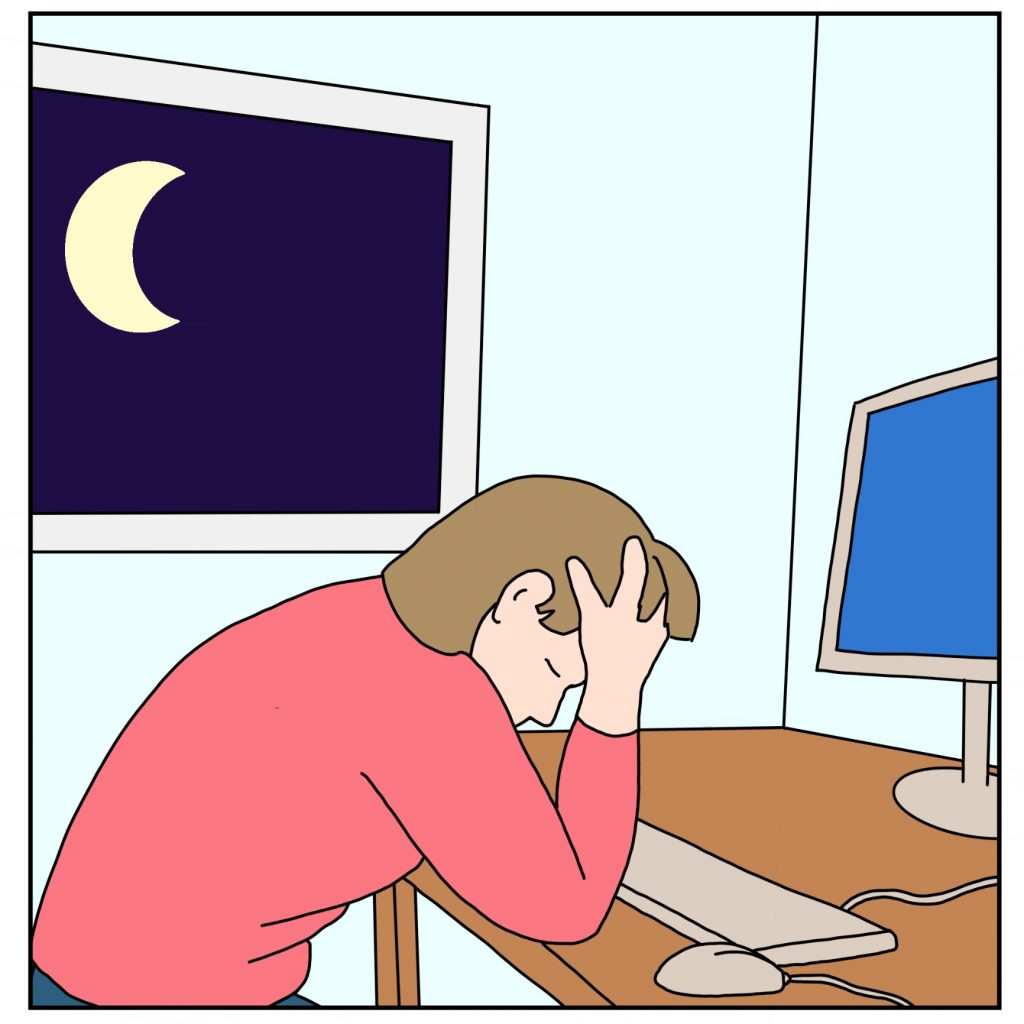
I take responsibility for the lack of personnel, the amount of work and the wellbeing of everyone but myself. The full answer should be “I value my coworkers and my job more than my physical and emotional wellbeing”. But of course, I do not want to say that. It sounds off.
What could I do instead?
I could give at least myself the honest answer, admit that this does not do me good, and head home.
I can talk to my boss about the workload.
I could file a complaint with the personnel department or workers council.
I could make myself a priority. Maybe before all else fails.
Dropping out of contact with friends
This is often what happens when I am amassing too much overtime. Something´s got to give, after all.
What happens?
I have messages, emails or physical mail sitting around. Some include invitations to a party, or meet for a coffee. Some just require more time to answer. They sit and sit and get older until I am not sure if they have not sat for too long to be answered. And I feel both stressed out and embarrassed while also feeling guilty and like a bad friend. Plus, I have not talked to anyone about the stressors that leave me feeling like I do not have time for friends. So my issues remain my own as well.
Why is this self-harm?
Humans are social beings. Even a hermit such as I needs contact. Someone to share woes and joys with. Positive social interaction does not just bring joy, it also causes chemical reactions in the body that have beneficial effects.
Isolation is a form of torture because we need other human beings. Even if it is just someone to listen to my troubles to make me feel less alone. Denying myself that possibility is making my life harder than it needs to be.
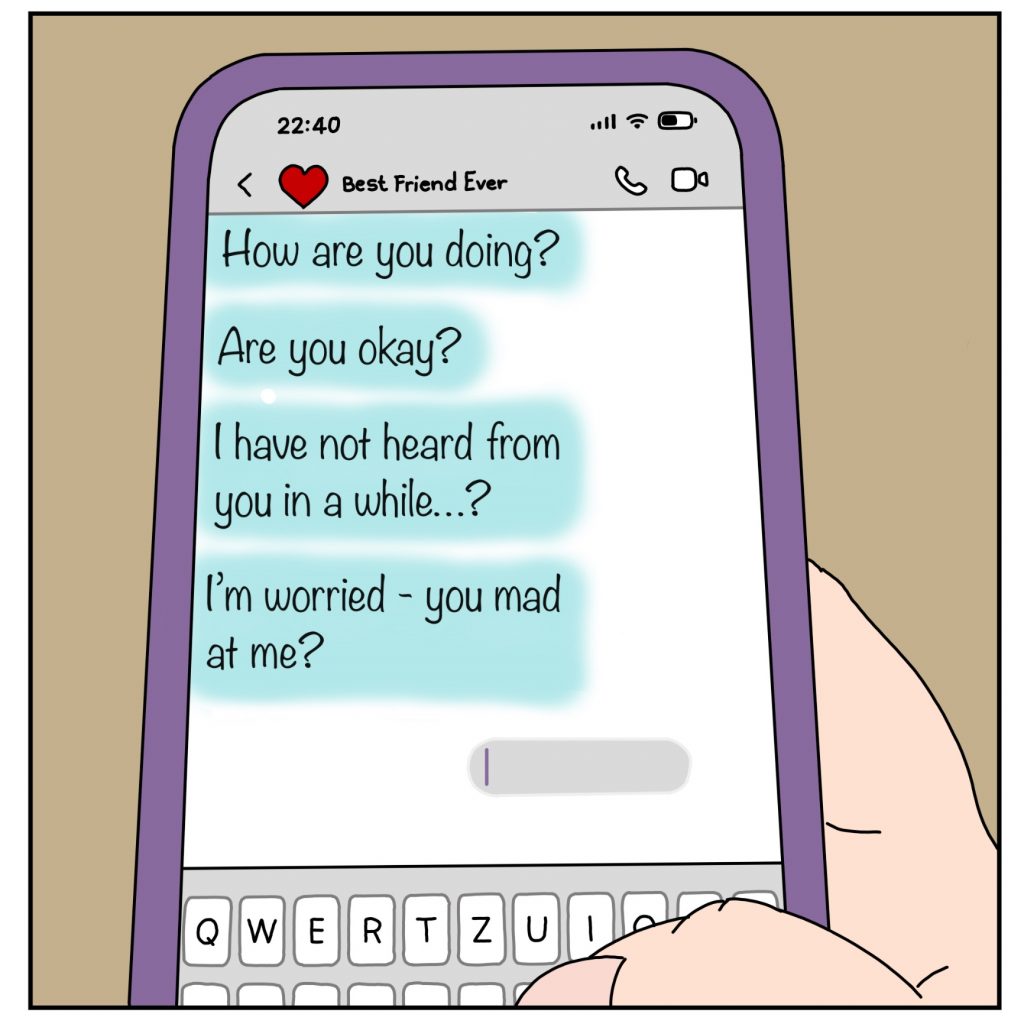
Why do I do that?
I always think that I can do that later. When I have time. When things have settled down.
I also used to believe that I need to do my chores first and can do fun stuff later, if there is time and energy left. Which means that joy often falls short, which makes it hard to recharge.
What could I do instead?
I have started putting self-care items on my to-do lists. Things like meeting friends, taking a bath, reading a fun book, going for a walk. This has helped me immensely.
I also have adopted a new mantra: Self-care is not a reward it is a necessity.
Variant:
Sometimes I find it easier to reach out to people when I am not feeling well, as then I have something to tell. I then fall out of contact when I am doing better, because nothing interesting is happening and I do not want to be a boring annoyance. Until lack of contact leads to me feeling unwell again.
For me a way out of this was checking with my friends and learning that they do like to hear boring stuff from me because they care.
Not calling in sick when I feel awful
Due to the improved possibilities to work from home this has become easier. Still, it happens more often than it should.
What happens?
I go to bed feeling awful, I wake up feeling awful. I think that I really should stay at home. Maybe I also have a cold or some digestive issues. Still, I somehow find myself on my way to work, to at least give it a try.
Why is this self-harm?
It is harder to get well again if I do not rest. I am willingly risking getting worse.
Why do I do that?
The reasons are more or less the same as for amassing overtime.
Another reason is the thought that of course only I am able to do what needs doing at work, which, in most cases, is not true.
What could I do instead?
If something really needs to happen, I can try to make it happen from home.Or I can try to brief someone from home.
Or I can see if the thing can be rescheduled.
Mostly I need to ditch the thinking that my duty to work ranks higher than the duty to see to my own health.
I need to value myself and my health more.
Not asking for help when I need it
That depends on what counts as “needing” help. I can do a lot of things on my own that would just be infinitely easier with help.
What happens?
For example, I am taking down my old wardrobe and later setting up the new one. Taking down the old one ends with one mirror door in splinters and shards around me and me barely being able to duck out of the way of the top as it comes crashing down. Building the new one (the directions pictured 2 people) took ages and had me cursing in symbols. Both activities left me with interesting bruises.
Why is this self-harm?
Apart from actually harming myself in the process, it also cost me far more time and energy and strength and nerves than it would have if I just had asked someone.
Why do I do that?
I would say that it was a spontaneous action (as spontaneous as building furniture gets, I mean) and I was well able to do so alone, so I did not need help.
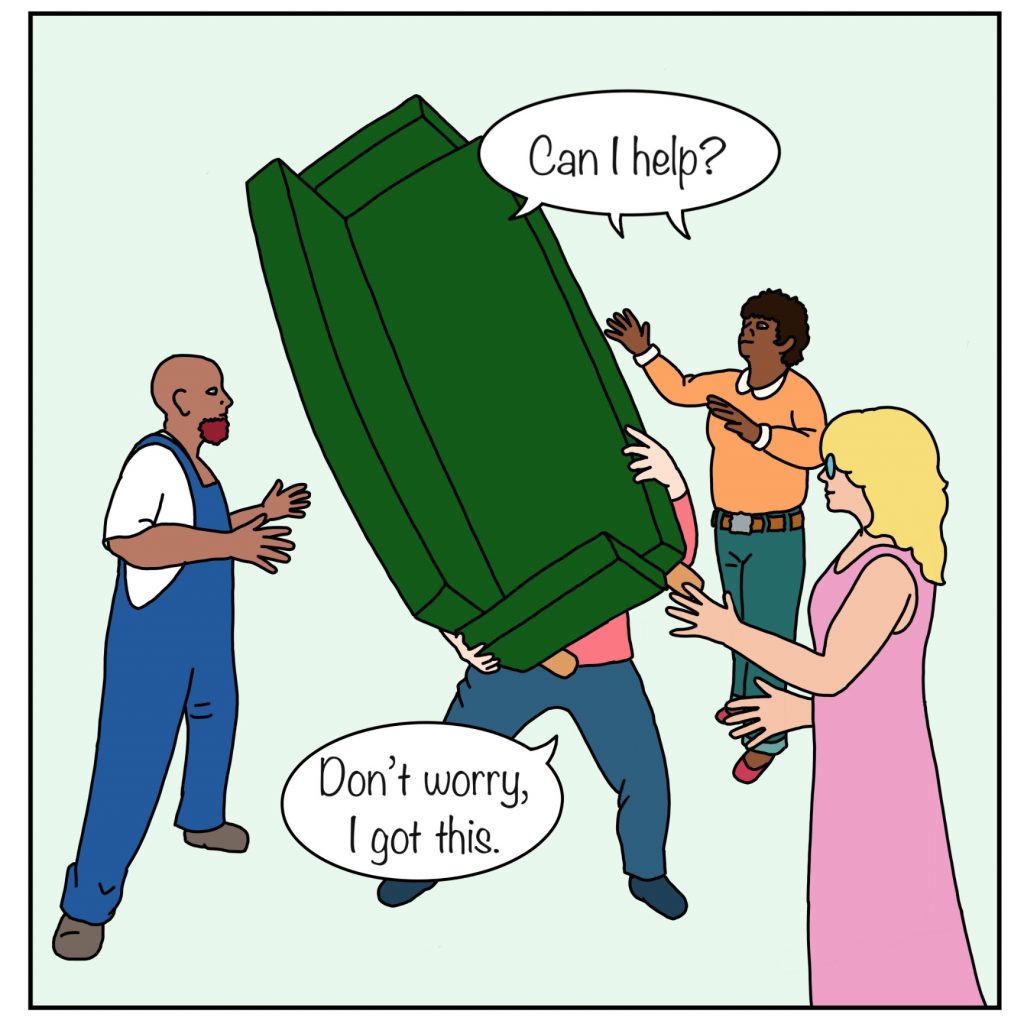
I would omit the far more important point that I do not want to impose on anyone. I do not want to be a burden. Also, I do not want to take heart and ask someone for help only to be denied, because that would hurt. So, I do not ask.
What could I do instead?
I could accept that I have amazing friends.
I could take the risk to ask someone instead of taking the risk to be smothered by my wardrobe.
I could stop behaving like I was an island.
I am working on that.
Casual sex for the wrong reasons
Content note/trigger warning: Sexual abuse, rape (no graphic description)
There is exactly nothing wrong with casual sex as such. Done for the right reasons it can be great fun for all involved.
What happened?
For me this is tricky to be open about because of the prejudice against women who dare to have casual sex.
When I was younger, I did for a while have sexual encounters that I had not been enthusiastic about before, during or after they happened.
I sort of treated sex as a performance, not a real interaction. I had no emotions about the situation because it was not really, actually happening to me. I was just an actress in a part, this was not my body, just a mask. Because if this was not happening to my body, maybe the other things had not happened to my body either, bit to a role that I was separated from.
Why was this self-harm?
Changing sexual partners does, even when using protection, always carry some risk of STDs or pregnancy.
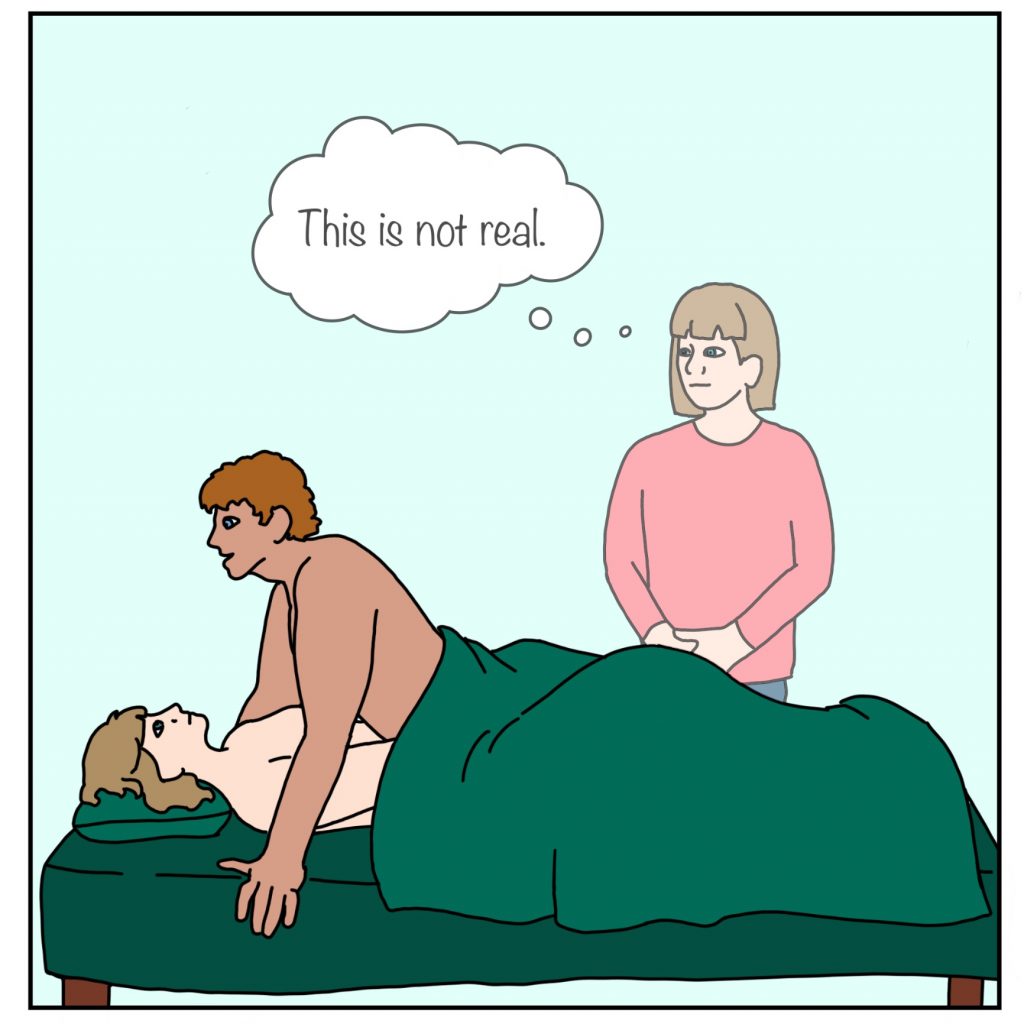
Having sex without being into it is also not always emotionally healthy if it turns into a habit. Unless, of course, you are a sex worker, but then it is not casual, but professional.
Why did I do that?
Context: The first time I have been sexually harassed and touched against my will happened when I was maybe 10 or 11. I think. A couple of older guys groped me in the playground until I managed to run away. At 16 and 17 my then-partner repeatedly assaulted and raped me. Later partners used emotional blackmail or other was of pressure.
As I could not undo what had happened to me, I did the next best thing: I turned sex into something that was not special. I kind of thought that if I gave my consent at the drop of a hat, my consent was not worth much, so it did not matter if I had given it or not.
If anyone could have me, it did not matter that he just took me.
I tried to minimize the pain by devaluing what was taken from me.
What can I do instead?
I can heal. Let me expand a bit on that.
It took me a while until I accepted that I was a victim of rape.
This was the late 80s, early 90s. Until 1992 there was no legal term for rape within a marriage. That only became a crime in the late 90s. In the common perception a partnership was not treated much different from that. If you were in a relationship, you had basically consented to sex.
This was way before #metoo
Unless this is a part of a previously and explicitly agreed upon game with a safeword:
- If I say “no” and my partner keeps going, it is rape.
- If I try to fight my partner off and they keep going, it is rape.
- If I cry the whole time whimpering, it is rape.
- If I am dead drunk, it is rape.
- If I am still asleep, it is rape.
- If my partner says, “If you truly love/forgive me, you will do x”, it is duress.
- If my partner says, “If we do not have sex at least once a week, I’ll pay someone from the household money for that” it is duress.
- If my partner says, “If we don’t sleep together, at least blow me off” and forces me downwards, it is at least duress.
All these things happened to me. It was hard to admit that all of this was a grave mistreatment of myself.
That it had, indeed, been bad. That it had hurt me. That it broke something within me.
For a long time, I felt guilty for having allowed that to happen to me. Until I admitted that I had been helpless. It had not been my choice. I did not allow this. I did not agree to this. To any of this.
Admitting this gave me a chance to heal. A chance to reclaim my sexuality and take joy in it again.
This sounds simple, but it took quite some time and help.
Denying myself joy
Sometimes I had plans I was looking forward to. Things that give me joy. And then they did not happen.
What happened?
Maybe I saw a little something that made me happy and that I could afford, but I did not buy it, because I did not technically need it. Maybe I was sad afterwards I did not get it.
Maybe I planned to take a walk but made myself stay at home and do the laundry which could have waited another day.
Maybe I was invited to a party but found a reason why I would not go.
Why is this self-harm?
Joyful experiences are important to balance not so joyful ones. They help me recharge my batteries and also give me something to hold on to when things are less bright.
Denying myself such experiences for no good reason except to deny me that joy is harmful.
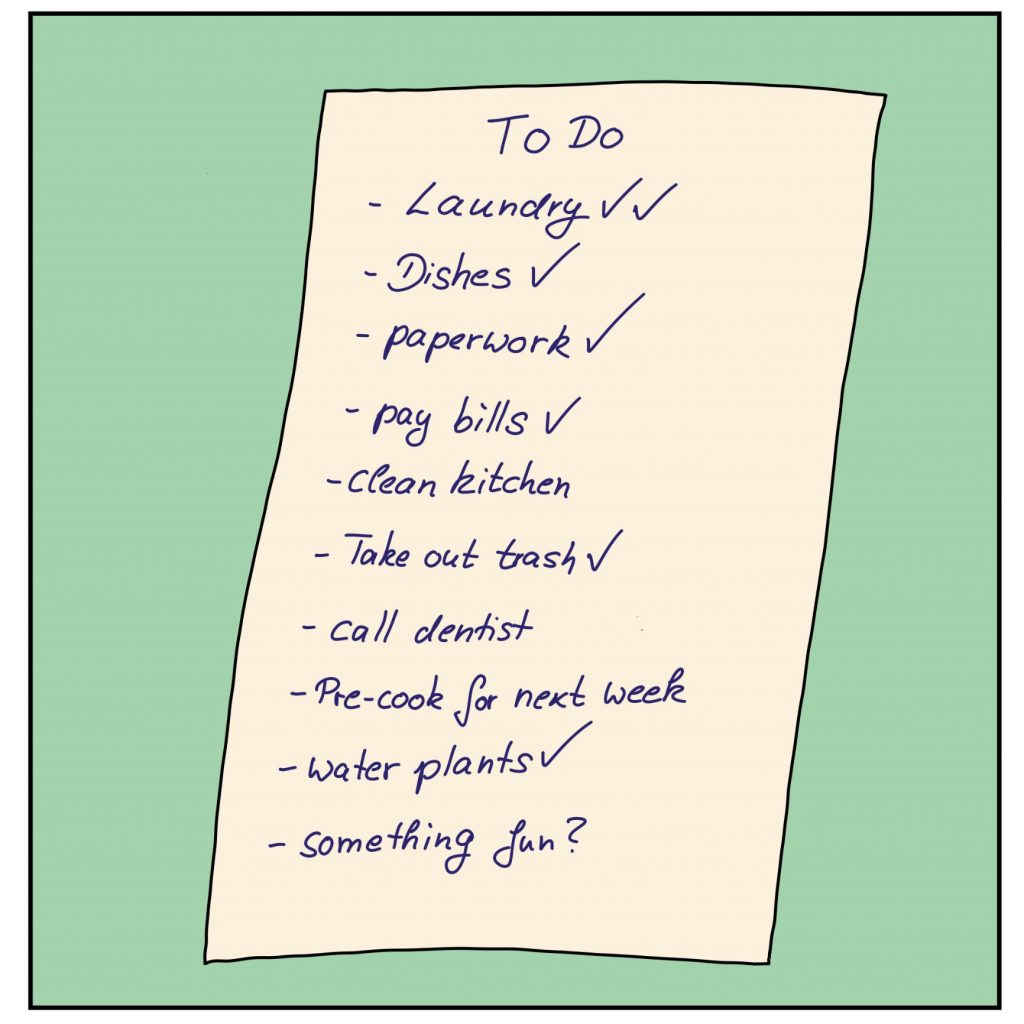
Why did I do that?
In my first relationships, I learned that the one who says “no” is the one in control. The one who can withhold fun, or love, or approval is the one with the power.
So, when I felt like I was tossed about and helpless, I denied myself things in order to prove that I was still in control of *something*.
What do I do instead?
I am trying to accept that sometimes I am just not in control. That this is not a fault of mine, but just the way things sometimes are.
And when I have the chance to grant myself some joy in those times, I try to use it. Because granting joy is as deliberate an act as denying it.
Trash talking myself
When I stand in a grocery store and realize I have forgotten my shopping list, it can happen that I call myself a stupid idiot. Or when I am clumsy and trip over my shoes that I left lying around in the hallway, I blame myself for that. While not technically wrong, this is still not helpful.
What happens
When something goes wrong, I blame myself and rant at myself. Maybe I call myself an idiot for forgetting someone’s birthday. Maybe I am calling myself a lazy beast for taking the bus home instead of walking the 15 minutes on a nice day. Maybe I call my self an ugly, unlovable waste of space because I forgot to hang the laundry yesterday. There are different flavors of trash talking myself, but none of them feel great.
Why is this self-harm?
It is, at the very least, insulting. I am using terms for me that I would not use for a friend, because I know it would hurt them. With me, I do not have these reservations. Hurting myself is okay. Apparently.
Only, it is not. I deserve better, even and especially from myself. For I am not on my side, who is?
No amount of berating, belittling, or shaming myself will improve the situation I find myself in. It will only make it worse.
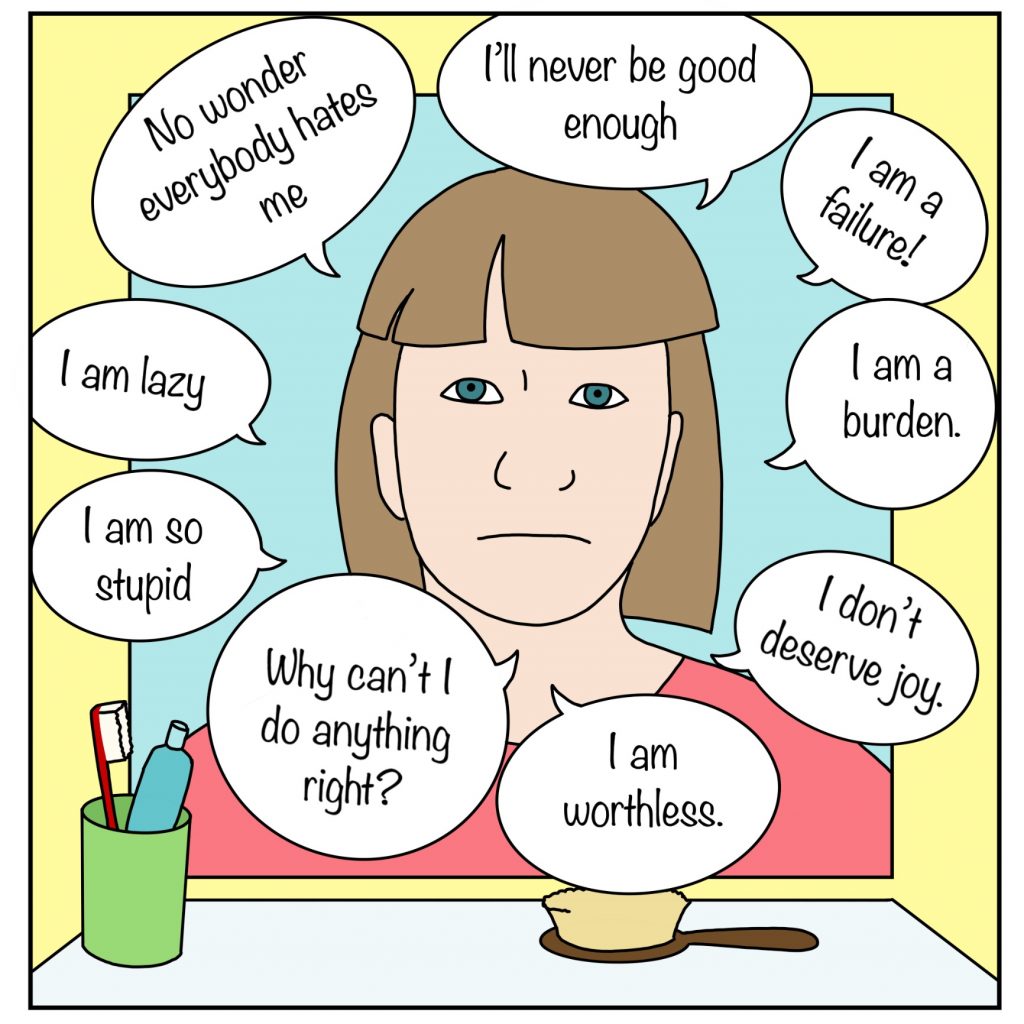
What can I do instead?
I can show myself some compassion first and then seek a solution if one is needed. That means, if I realize I forgot the shopping list I can say “You must be really tired to have left that at home, thank you for doing the shopping anyway” and then take a moment to put together a new list. It might not hold all items, but probably more than if I first rant at myself and then try to make a list while feeling really bad.
I can hug myself after tripping over my shoes, check if I got hurt, and then put the shoes away.
I can forgive myself for forgetting the laundry, start a new rinse and then hang it.
I can cut myself some slack and treat me like a friend, or at least like a person.
Variant:
Instead of trash talking myself I did for a long time also “hear” the voices of other people with their usual criticism. “You are too picky”, “You just need to try harder”, “You were always lacking discipline”. It helped me to identify the “voice” and to imagine myself standing up to them saying “No. You are wrong” and then maybe think of examples that proved my point. It did not help instantly, but over time. And over time it was also easier to remember positive examples in the situation.
Switching to “Auto Pilot”
It is so very easy to slide back into old habits and take on the expected role. Often much easier than trying to stay aware of how I feel and what I feel like doing at any given time. I often witness that happening to me at parties with old friends/acquaintances which I have not seen in a long while.
What happens?
When I am a bit under the weather anyway and find myself among people I have not seen in a long time, I sometimes find myself falling back into my old strategies and behaviors. Often that means that all of a sudden, I am in entertaining mode, telling fun stories, rib and riposte with others. It is fun.
But it is also completely pasting over the fact that I am tired, that maybe I do not feel all too well.
It feels like putting on my party persona. Like slipping into a favorite character, so I am not really there at all.
Afterwards I find it hard to connect back to the real me and my emotions.
Sometimes this little vacation from my worries can be invigorating. More often it leaves me drained.
Why is this self-harm?
I am not checking in on myself, am not taking note of how I feel, what I need. If I come out of that refreshed and filled with joy, I was lucky.
But if I come out feeling drained and tired and not being myself, then I did not take good care of me but exploited my energy with nothing to show for it.
And I hid the person I was at that moment; I did not give me a chance to be myself.
Why do I do that?
Masking is one of the first things I learned, and I know that many other people with mental health issues share this. I mask, so no one asks me how I feel, so I do not fall apart. Pretending to be fine is often easier than going through how I really feel.
It makes me less vulnerable.
And if I am good enough at masking, I can even fool myself for a while.
What could I do instead?
I am trying to keep a better eye out for myself, to take care of me and my needs.
I am learning that a vulnerability can be a strength.
That admitting to feel bad is giving others the chance to help me out a bit.
That being at my authentic “not best” in an environment that supports this is doing me more good than pretending.
Pretend everything is well
I have touched upon this just before. I used to do that a lot.
What happens?
Someone asks me how I am, and I say “fine” and smile, even though a moment before I was crying.
Or I go see my doctor and I smile and nod, while feeling horrible.
Or I tell my story to a new psychiatrist or therapist, lightening the mood between the tough bits with a joke. Laughing away my pain.
Why is this self-harm?
Especially with doctors and/or therapists, this is self-sabotage. These people can only help me if they know how I feel. My pain and my trauma are hard to see and recognize if I keep joking.
Thus, I am making it harder for me to get help or to be cut some slack or to be really seen.
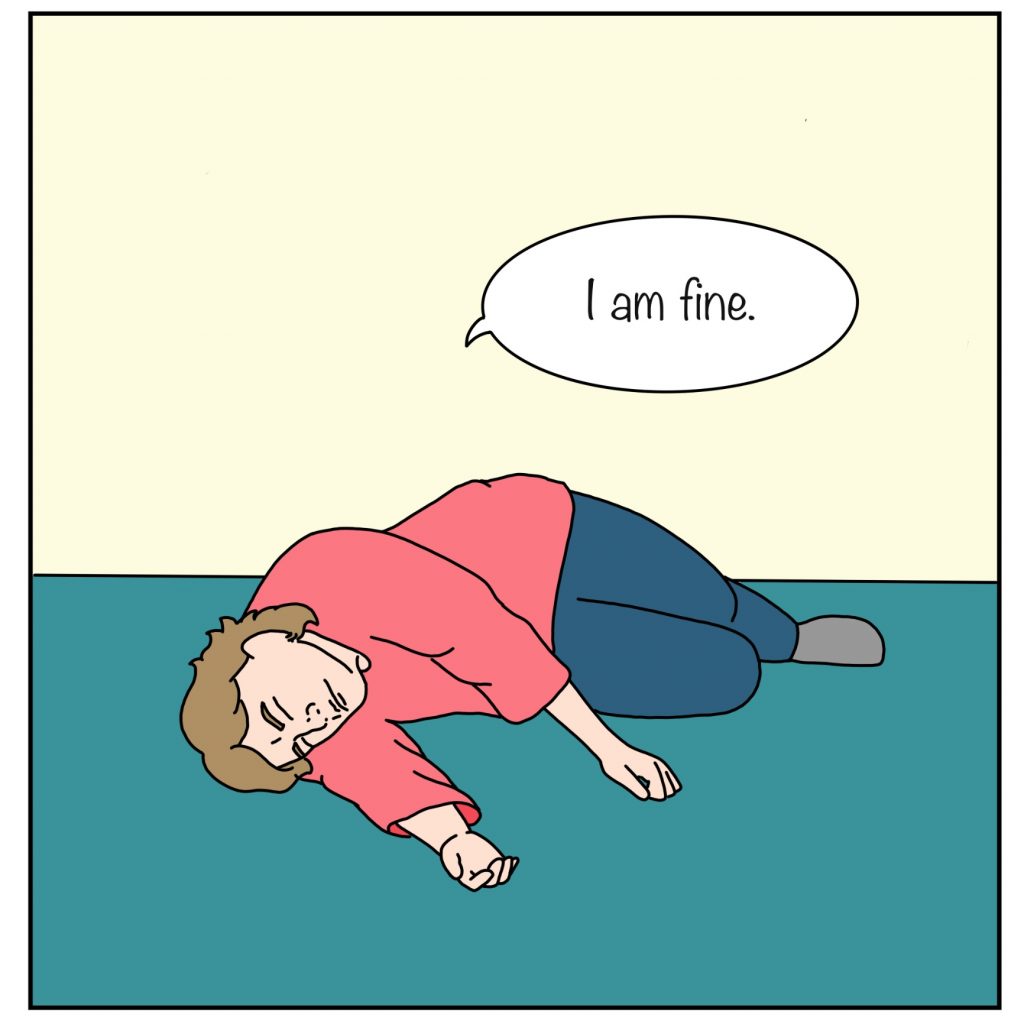
Why do I do that?
Two reasons: I do not want to be a burden. I do not want the other person to feel bad. So, I joke a bit and make them laugh in order to make listening to me more palatable. I do not want them to worry. Because if I get too complicated, too hard to bear, they will send me away. I mean, I know they won’t, but tell that to my subconscious.
The other reason is that for a long time gallows humor is what kept me alive. If I could laugh about what happened to me or how I felt, it could not be too bad, right?
What could I do instead?
Before I see a doctor, I make a conscious effort to unmask, remembering that this is important.
When someone whom I trust asks me how I am, I tell them. I mean, sometimes “fine” is correct. Sometimes I am doing great. And sometimes I am not okay.
I have (almost) accepted that it is okay to not be okay.
And I have learned that a lot of people are at times not okay. It is good to be able to say that.